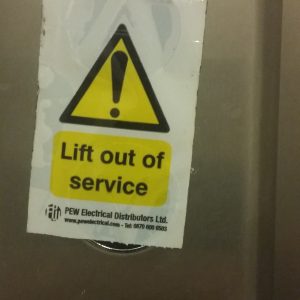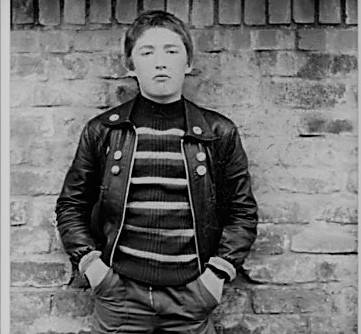Going Down: Why inadequate housing can be a jail sentence for the disabled

Many years ago, aged 16, I broke the law, and was remanded in custody to await my trial. Confined to my cell for up to 22 hours a day, it was sultry and ever-lasting, in that balmy summer of 1981. Occasionally I got to break the monotony of it all, strolling with my fellow inmates around the prison courtyard, carefully side stepping the ‘shit parcels’ strewn around – deposits from the night before.
I even once took part in a ‘Kamikaze’ game of football – Vinnie Jones would have been out of his league. But there were few highlights to remember of my stay.
Although my period of incarceration was short – I later got a community service order and fine – my loss of independence, hurt. Every sunset I would gaze beyond the walls and razor wire, to a distant hill bathed in the fading embers of the day. I wished I could teleport myself there, vowing never to return to my present home, if I could escape its confines.

Rude boy 1981
I never did either– literally. My part in the ‘Cirencester Riot’, should have seen me jailed. However, circumstances worked in my favour, but things could have been very different. One of my fellow conspirators was sent to Borstal, and later committed suicide soon after his release. Although I stuck to my vows, in a strange way I ended up following Gary down those stairs that day, when the judge ordered the warders to ‘’Take him down’.
Ok, my sentence was deferred by a few years but the onset of MS, and severe disability, metaphorically speaking, meant I went full circle back to that waiting cell. I’ve still got a room with a view, but this time it’s with a life tariff.
Doing this type of ‘Bird’ for me and countless others living with a chronic disease, can be hard labour. I count myself lucky though. Soon after diagnosis I became homeless, and went to the local council for help. A few months later they came up trumps, awarding me a flat.
My mobility was manageable to start with, but over the 10 years I lived there, the multiple steps became too much. My special needs, elevated me to the highest band on the transfer list. When a self-contained adapted apartment, became available nearby, I was more than happy to accept it and move in under the management of a Housing Association.
I’ve lived there for eight years now. My disease has continued to attack though, confining me to a wheelchair and now affecting my whole body. I could cry at my deal, but compared to countess others facing their own enforced confinement, mine is a bed of roses.
Recent research conducted by the Papworth Trust and the housing association Harbinteg – highlighted the chronic shortage of accessible housing in the UK. It estimates that 1.8 million people with disabilities – 56% who are homeowners, are often unable to leave their homes – many desperate for alternative accommodation.
I can still get out thankfully if my energy levels allow. It’s a bit of a lifeline, a chance to share a conversation, an opportunity to feel part of something. It reminds me sometimes of pounding those rounds at Pucklechurch. It always broke the boredom, gave me a chance to breathe. However, residing on the 1st floor of a housing block, I have a new incarcerator, whose reliability is often very poor – the lift.
Recently it broke down – again. It has now been motionless for 10 days. The landlord and lift engineers were quick to blame each other – no-one prepared to take responsibility, leaving me reliant on my neighbours. My problem though does not appear isolated. A quick search on google reveals many others marooned in their flats, because of sub-standard services.
I could sit there and take it but why should I? – I’ve done enough time already! As far as I’m concerned, the lift scenario infringes my human rights – It’s inaction has stripped me of my independence and I will refuse to pay my rent for the period it is out of order, and seek compensation for the inconvenience caused.
Everyone in a similar predicament should take a similar stand and action. We all have a voice and it is there to be heard. When those voices are amplified, they make a difference – otherwise nothing changes. If the Landlords want to argue my actions, then they are welcome. This has become a point of principle, a line I am prepared to hold, whatever the cost. After all, it’s not as though I’ve got a lot left to lose.
Future building forecasts and an ageing population, mean that time served for disabled people living in in-adequate properties is just going to get longer – little provision is being made for their future needs. Accompanied with the associated social problems, such as unemployment and mental health issues, Vicky McDermott, CEO of the Papworth Trust, hits the nail on the head, when she says, ‘Building more accessible housing is a fundamental part of future-proofing the housing market, with a short-term investment and a long term positive social impact on other services’.
The Government and relevant authorities, should heed her advice. Ignoring the evidence is no longer an option, otherwise it will slowly envelop them costing future generations billions. The factoring in of a fair percentage of accessible and adapted housing on all new developments should be made law and duly enforced.
It makes economic and social sense to do so. The freeing up of the housing market for able bodied people moving into vacated properties by disabled people would act as a stimulus, helping to alleviate housing problems. It would also bring some much, needed parole and independence, for those that have waited far to long for their bit of freedom, and a chance to feel part of something.